Blending Technology with Nature: TAAL Tech’s Agroforestry for a Sustainable Tomorrow
TAAL Tech, a leader in language solutions and digital content services, is driving environmental sustainability through its tree plantation initiative Read more
Plantation Site Gallery
Project Update 1

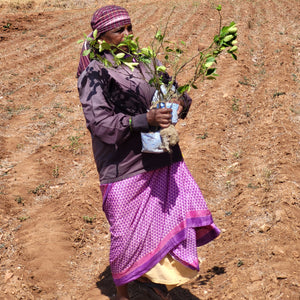


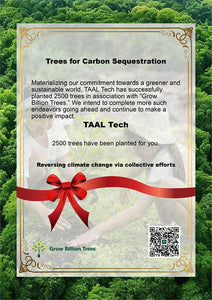
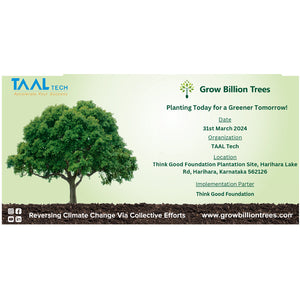
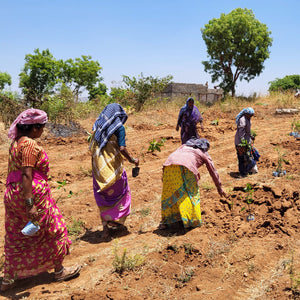

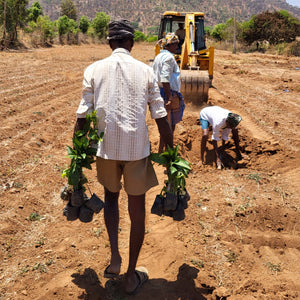
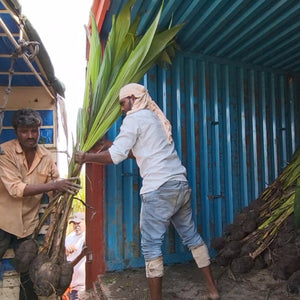
Digital Forest
Forest with 2,532 Trees planted
Want to plant your tree now?
Plant a Tree @ 299Blending Technology with Nature: TAAL Tech’s Agroforestry for a Sustainable Tomorrow
TAAL Tech, a leader in language solutions and digital content services, is driving environmental sustainability through its tree plantation initiative based on the agroforestry concept. This initiative highlights TAAL Tech's dedication to sustainable development goals by promoting ecological restoration alongside responsible land use.
By integrating tree planting within agroforests, the initiative enhances biodiversity, improves soil health, conserves water, and supports carbon sequestration. Additionally, agroforestry provides direct benefits to farmers by increasing crop yields, enhancing land productivity, and offering additional sources of income through the cultivation of fruit-bearing and timber trees. This farmer-centric approach strengthens rural economies while fostering long-term environmental resilience.
TAAL Tech’s commitment to sustainability through agroforestry serves as an inspiring model of how technology-driven companies can balance growth with environmental stewardship, reinforcing the importance of responsible corporate citizenship.
Tree Plantation Date
27th March 2024
Plantation Location
Harihara Lake Rd, Harihara, Karnataka 562126
Trees Planted
Total Count: 2532 Trees
Species Name: Mango, Guava, Lemon, Chiku, Coconut
Forest Type: Agroforest
TAAL Tech's agroforest tree plantation initiative is a forward-thinking approach to sustainability, aligning with the company's commitment to achieving sustainable development goals. By adopting the agroforestry concept, TAAL Tech integrates tree planting with agricultural practices, creating a harmonious relationship between crops and trees. This initiative not only enhances biodiversity and combats climate change by improving carbon sequestration but also provides vital benefits to farmers. Agroforestry boosts soil health, conserves water, and prevents soil erosion, which leads to increased crop productivity. Furthermore, it offers farmers additional income streams through the cultivation of timber, fruit-bearing trees, and other non-timber products. By focusing on farmer-centric benefits, TAAL Tech’s initiative helps empower rural communities, improve food security, and foster long-term environmental resilience, creating a sustainable future for both people and the planet.
Advantages Of Agroforest
Enhanced Income Diversification
Agroforestry creates an opportunity for farmers to diversify their income streams. By planting trees alongside crops, farmers can generate additional revenue through the sale of timber, fruits, nuts, and other non-timber products such as medicinal plants or resins. This diversification helps reduce the financial risks associated with relying solely on traditional crops, especially in the face of fluctuating market prices or climate-related disruptions.Improved Livelihood Resilience
Agroforestry enhances the resilience of farmers’ livelihoods by providing a buffer against climate variability and economic shocks. Trees improve microclimates and help regulate temperature and humidity, benefiting the surrounding crops. The diverse ecosystems created by agroforestry make farming systems more adaptable to extreme weather conditions, ensuring more stable production and income over time.Reduced Farming Costs
Agroforestry practices can lead to a reduction in farming costs by improving soil fertility naturally. The deep-rooted trees bring nutrients from lower soil layers, enriching the soil for crops. Additionally, trees reduce the need for external inputs such as fertilizers and pesticides by promoting a balanced, healthier ecosystem. With better soil health and lower input costs, farmers can achieve higher yields without increasing financial burdens.Increased Crop Yields
Trees in agroforestry systems contribute to enhanced soil quality through natural processes like nitrogen fixation and organic matter enrichment. These improvements lead to better soil structure and moisture retention, resulting in higher crop yields. The trees also provide natural windbreaks and shade, protecting crops from harsh weather conditions such as strong winds or excessive sunlight, further contributing to increased productivity.Environmental Sustainability
Agroforestry plays a vital role in environmental sustainability. The integration of trees with crops enhances biodiversity by providing habitat for various plant and animal species. Additionally, the presence of trees helps mitigate climate change by sequestering carbon dioxide from the atmosphere. Trees also play a crucial role in soil conservation by preventing erosion and maintaining the health of waterways, thus promoting long-term ecological balance.Soil Erosion Control and Water Conservation
One of the most significant benefits of agroforestry is its ability to combat soil erosion and improve water retention in the soil. The root systems of trees help bind the soil together, preventing erosion caused by heavy rains or wind. This is especially important in areas prone to desertification or deforestation. Additionally, trees help conserve water by reducing surface runoff and increasing groundwater recharge, which is crucial for sustaining crops during dry seasons.Carbon Sequestration and Climate Mitigation
Agroforestry systems are highly effective in sequestering carbon, helping mitigate the effects of climate change. Trees absorb carbon dioxide from the atmosphere and store it in their biomass and the surrounding soil. This contributes to reducing the carbon footprint of agricultural activities and supports global efforts to combat climate change. By implementing agroforestry practices, TAAL Tech’s initiative aids in fostering a more sustainable environment while benefiting farmers.Stronger Rural Communities
By supporting farmer income and promoting environmental stewardship, agroforestry strengthens rural communities. Farmers who adopt agroforestry practices experience economic growth, which leads to improved quality of life and better access to education, healthcare, and other resources. Additionally, agroforestry helps to create more stable and prosperous rural economies by reducing migration to urban areas and fostering sustainable land management practices.Long-Term Sustainability and Ecosystem Restoration
Agroforestry promotes long-term sustainability by restoring degraded lands and improving ecosystem health. By combining agriculture with forestry, the initiative aids in the regeneration of soil fertility and the revival of local ecosystems. This holistic approach ensures that farming systems remain productive for generations to come while maintaining healthy forests and natural habitats.Healthier Ecosystems and Biodiversity Preservation
Agroforestry supports the conservation of biodiversity by creating diverse habitats for a wide range of plant and animal species. The presence of various tree species alongside crops enhances the resilience of ecosystems and provides natural pest control, reducing the need for harmful chemical interventions. This promotes overall ecological health and contributes to the preservation of native species and biodiversity.
Activities During Tree Plantation
During TAAL Tech’s tree plantation initiative in the agroforestry concept, all plantation activities were carried out by farmers, with the company supporting the effort through preparation and planning. The farmers planted various tree species that are beneficial for both the environment and local agriculture, such as fruit-bearing trees, timber species, and nitrogen-fixing trees that improve soil health. The planting process involved careful site selection and soil preparation to ensure the sustainability of the trees and crops. Farmers also received guidance on best practices for integrating trees with their agricultural systems, ensuring optimal growth and productivity. Throughout the initiative, the focus was on enhancing the agricultural landscape while promoting biodiversity, soil conservation, and water management, all within the framework of sustainable agroforestry practices.
Tree Plantation Purpose
SDGs Achieved Through TAAL Tech’s Agroforest Tree Plantation Initiative
1. SDG 1: No Poverty
TAAL Tech’s agroforestry initiative contributes to poverty reduction by providing farmers with additional income through the cultivation of timber, fruits, and other non-timber products. This income diversification helps reduce financial dependence on a single crop, offering farmers greater economic stability and improved livelihoods, especially in rural areas where poverty rates are often higher.2. SDG 2: Zero Hunger
By integrating trees with agricultural crops, TAAL Tech’s initiative supports food security and enhances the availability of diverse, nutritious food sources. Fruit-bearing trees, for example, provide essential vitamins and minerals, while the improved soil quality from agroforestry practices boosts crop yields. This contributes to more sustainable, resilient food systems, helping to combat hunger and malnutrition.3. SDG 3: Good Health and Well-being
The tree plantation initiative indirectly promotes health and well-being by improving air quality through carbon sequestration and increasing access to a variety of nutritious foods grown alongside agroforestry crops. Additionally, the reduced use of chemical fertilizers and pesticides in agroforestry systems can lead to healthier farming practices, improving the overall health of the communities involved.4. SDG 6: Clean Water and Sanitation
Agroforestry helps conserve water and maintain water quality. The trees planted in this initiative act as natural filters, reducing runoff and preventing soil erosion. They also help recharge groundwater supplies by improving water retention in the soil, ensuring more reliable water resources for farmers and surrounding communities, especially in drought-prone areas.5. SDG 8: Decent Work and Economic Growth
The agroforestry project creates job opportunities and fosters economic growth in rural areas. By promoting the cultivation of high-value crops alongside trees, farmers can diversify their incomes, leading to greater economic resilience. The project also encourages sustainable agricultural practices, which can improve productivity and economic opportunities in the long term, ultimately contributing to decent work and economic growth.6. SDG 12: Responsible Consumption and Production
TAAL Tech’s tree plantation initiative supports sustainable land-use practices that align with the principles of responsible consumption and production. Agroforestry systems reduce the dependency on harmful agricultural practices by enhancing soil fertility, promoting biodiversity, and using fewer chemical inputs. By practicing sustainable farming, farmers are contributing to more responsible, long-term agricultural production that minimizes environmental degradation.7. SDG 13: Climate Action
Agroforestry is a proven climate mitigation strategy, and TAAL Tech’s initiative contributes directly to climate action. Trees planted as part of the agroforestry system help sequester carbon dioxide, mitigating the effects of climate change. Moreover, the trees enhance soil carbon storage and improve resilience to climate extremes, making the agricultural landscape more adaptable to changing climate patterns.8. SDG 15: Life on Land
The agroforestry model directly contributes to the preservation of terrestrial ecosystems by promoting biodiversity. The variety of tree species planted alongside crops creates a more diverse habitat for wildlife, helping protect native species and increase the resilience of ecosystems. Additionally, agroforestry systems improve soil health and reduce deforestation, contributing to the restoration and conservation of land.9. SDG 17: Partnerships for the Goals
TAAL Tech’s partnership with Grow Billion Trees has significantly advanced the achievement of SDG 17: Partnerships for the Goals, by fostering collaborative efforts toward environmental sustainability. Through this partnership, TAAL Tech has joined forces with Grow Billion Trees to implement large-scale tree plantation initiatives, especially focusing on agroforestry systems that integrate both tree planting and agricultural practices. This collaboration has helped bridge the gap between corporate responsibility and grassroots efforts, providing farmers with the necessary tools, knowledge, and support to adopt sustainable farming techniques. By working together, both organizations have been able to enhance environmental awareness, promote biodiversity, and mitigate climate change while strengthening local communities economically and socially. This partnership is a prime example of how organizations can unite their expertise and resources to drive meaningful change, contributing to the collective achievement of the United Nations' sustainable development goals.
ESGs Achieved Through Agroforestry
Environmental (E)
TAAL Tech's tree plantation initiative in the agroforest concept contributes significantly to environmental sustainability by promoting biodiversity and enhancing the health of ecosystems. The integration of trees into agricultural systems helps in soil conservation by preventing erosion and improving soil fertility, which is vital for long-term agricultural productivity. The trees also improve water retention and reduce runoff, benefiting both farmers and local water systems. Furthermore, through carbon sequestration, the initiative aids in mitigating climate change by capturing carbon dioxide from the atmosphere. By restoring and regenerating land with agroforestry practices, TAAL Tech plays an essential role in preserving ecosystems, protecting wildlife habitats, and contributing to overall environmental resilience.Social (S)
The social impact of TAAL Tech's tree plantation initiative is profound, as it directly benefits local farming communities by empowering farmers with sustainable agricultural practices. By integrating trees into their farming systems, farmers not only gain additional income through the sale of timber, fruits, and non-timber products but also experience improved food security due to more diverse crops. The initiative enhances community resilience, especially in rural areas, by providing farmers with tools and knowledge to adapt to changing environmental conditions and economic challenges. Additionally, the focus on agroforestry helps create long-term employment opportunities and strengthens local economies, fostering better livelihoods and contributing to the overall well-being of the communities involved.Governance (G)
TAAL Tech's partnership with Grow Billion Trees has played a crucial role in enhancing the governance aspect of its ESG (Environmental, Social, Governance) strategy, particularly in its tree plantation initiative under the agroforestry concept. Through this collaboration, TAAL Tech has ensured transparent and ethical management of the initiative by adhering to established environmental standards and best practices. The partnership has facilitated effective oversight and accountability, ensuring that the project is implemented in alignment with sustainable land-use practices and responsible resource management. Both organizations have worked together to involve local communities, farmers, and environmental experts in the decision-making process, ensuring that the benefits of the agroforestry initiative are maximized while minimizing any potential risks. This strong governance framework, reinforced by the partnership with Grow Billion Trees, ensures that the tree plantation initiative contributes to long-term sustainability goals and fosters trust among all stakeholders, enhancing the overall governance structure of TAAL Tech’s ESG commitments.
Commitment by Grow Billion Trees
Grow Billion Trees is committed to driving sustainable plantation efforts, ensuring every initiative aligns with key environmental objectives and promotes long-term ecological balance. We focus on selecting native tree species that are well-adapted to local ecosystems, ensuring a higher survival rate and stronger environmental impact.
To maintain plant health and longevity, Grow Billion Trees emphasizes continuous maintenance and regular monitoring of the plantations. This approach helps ensure that each tree thrives, contributing effectively to both biodiversity and climate resilience.
Transparency is a core principle in our operations. Clients receive comprehensive reports, including geo-tagging of planted trees, survival rate updates, and ongoing progress reports. This level of openness allows clients to track the direct impact of their contributions, reinforcing trust and accountability.
Through our dedication to sustainable practices, Grow Billion Trees ensures that every plantation project leaves a lasting positive footprint on both the environment and the local communities it serves.
Summary
TAAL Tech's tree plantation initiative in the agroforestry concept focuses on employee engagement and the achievement of sustainable development goals (SDGs) by integrating tree planting with agricultural practices. This initiative empowers farmers to plant and maintain trees alongside their crops, providing environmental, social, and economic benefits. Through the integration of fruit-bearing, timber, and nitrogen-fixing trees, the project enhances biodiversity, improves soil health, conserves water, and mitigates climate change. By supporting local farmers with sustainable practices, the initiative helps diversify their income, increase resilience to climate impacts, and improve livelihoods. Furthermore, TAAL Tech's partnership with Grow Billion Trees strengthens the governance and impact of the initiative, ensuring ethical, transparent, and responsible management. Ultimately, this tree plantation initiative contributes to multiple SDGs, including poverty reduction, food security, climate action, and life on land, fostering a more sustainable future for both employees and the communities involved.Trees for Corporates
Trending
Most Popular
1. Sustainable Agroforestry
Sustainable agroforestry is the fusion of trees and agriculture for a greener future. It’s like a win-win situation—farmers grow their crops while trees do the heavy lifting, improving soil quality, enhancing biodiversity, and tackling climate change. TAAL Tech’s tree plantation initiative in the agroforestry concept embodies sustainable farming by allowing farmers to plant trees alongside their crops. The trees not only provide additional income through fruits, timber, or non-timber products but also create a more resilient environment. The best part? Agroforestry systems help farmers adapt to environmental challenges, improve water retention, and reduce soil erosion. Plus, who doesn't love more shade on a hot day? Sustainable agroforestry is a game-changer for both agriculture and the planet, creating a balance between productivity and environmental preservation.
2. Climate Resilient Farming
Farming in the face of climate change can feel like a rollercoaster, but with climate-resilient farming practices, it doesn’t have to be a wild ride. TAAL Tech’s agroforestry approach is a perfect example of climate-smart agriculture. By planting trees alongside crops, farmers can better withstand extreme weather conditions, from droughts to floods. The trees act as natural barriers against strong winds and reduce the impact of erratic weather patterns. Moreover, the shade provided by trees helps moderate soil temperature and retains moisture, giving crops a fighting chance against heatwaves. It’s not just farming; it’s future-proofing agriculture for the unpredictable future.
3. Carbon Sequestration in Agroforestry
Agroforestry isn’t just about trees and crops—it's about making a serious environmental impact. TAAL Tech’s tree plantation initiative plays a key role in carbon sequestration, where trees suck up carbon dioxide (CO2) from the atmosphere and store it in the soil. This process not only combats climate change but also enriches the soil, making it healthier for future planting. Carbon sequestration is like nature’s own air purifier, and agroforestry systems are the perfect tool for it. By integrating trees into agricultural landscapes, TAAL Tech helps sequester more carbon, turning farms into carbon sinks and contributing to the global fight against global warming.
4. Soil Fertility Improvement
Soil is the unsung hero of agriculture. When properly cared for, it supports bountiful harvests, but it’s not just about the right amount of water and fertilizer. TAAL Tech’s agroforestry initiative is all about nurturing soil fertility. By planting trees like nitrogen-fixing species, the initiative replenishes the soil’s nutrients naturally. These trees release nitrogen into the soil, reducing the need for chemical fertilizers. With healthier soil, farmers see better crop yields and fewer soil erosion issues. It’s a simple equation—healthy soil = healthier crops, and with agroforestry, the soil keeps giving back for generations.
5. Biodiversity in Agroforestry
Biodiversity in agroforestry is like adding flavor to a dish—it enhances everything. TAAL Tech’s tree plantation initiative embraces this principle by planting a mix of tree species that support diverse wildlife, from insects to birds to mammals. These trees create habitats for different species, promoting a balanced ecosystem within the agricultural landscape. The result? Healthier farms, greater pest control, and stronger resilience against diseases. With increased biodiversity, the land becomes more vibrant and sustainable, fostering a thriving environment for both plants and animals. Agroforestry isn’t just for crops—it’s a sanctuary for all living things.
6. Farmer Empowerment in Agroforestry
Who says farmers can’t be superheroes? With TAAL Tech’s agroforestry tree plantation initiative, farmers are empowered to adopt sustainable farming practices that benefit their pocketbooks and the planet. By planting trees alongside their crops, farmers diversify their income streams with timber, fruits, and even medicinal plants. Agroforestry also strengthens their ability to cope with climate risks, making farming more resilient to droughts and floods. With access to better agricultural knowledge and resources, farmers are more confident in managing their land. It’s about time farmers get the recognition they deserve—after all, they’re the true champions of sustainability.
7. Water Conservation through Agroforestry
Water is life, and agroforestry helps ensure that this precious resource is used wisely. Through TAAL Tech’s tree plantation initiative, farmers are equipped with the tools to conserve water and reduce wastage. Trees planted in agroforestry systems play an important role in water retention, reducing runoff and helping to maintain groundwater levels. The shade from trees also keeps the soil cooler and reduces evaporation, ensuring that crops have enough moisture to grow. This sustainable approach to water use is vital for maintaining the health of the land, especially in areas prone to droughts or water scarcity. Agroforestry isn’t just about growing trees—it’s about growing smarter with water.
8. Multi-Crop Integration in Agroforestry
Agroforestry is all about diversity, and multi-crop integration is at the heart of it. By combining crops and trees in the same space, TAAL Tech’s initiative allows farmers to maximize land productivity. This system creates a more resilient farming operation where different crops can thrive together, reducing the risk of total crop failure. For example, trees can provide shade for delicate crops or act as a windbreak for more sensitive plants. Additionally, tree roots help in water retention, benefiting the entire system. Multi-crop integration offers farmers a balanced and diversified approach to agriculture, ensuring that they don’t put all their eggs in one basket while boosting overall productivity. It’s the agricultural equivalent of having your cake and eating it too.
FAQ
What is TAAL Tech's tree plantation initiative in the agroforest concept?
TAAL Tech's tree plantation initiative in the agroforest concept involves planting trees alongside agricultural crops, promoting sustainable farming practices. This approach enhances soil fertility, reduces erosion, and improves biodiversity. It also helps farmers diversify their income and build resilience against climate change. By integrating trees into farming systems, TAAL Tech aims to create long-term environmental benefits while supporting local communities and contributing to sustainable development goals.
How does agroforestry benefit farmers in India?
Agroforestry offers several benefits to farmers in India, including diversified income from both crops and trees. It enhances soil health, improves water retention, and reduces vulnerability to climate change. By integrating trees with crops, farmers can reduce dependence on chemical fertilizers and protect against soil erosion. Additionally, agroforestry helps farmers build resilience to changing weather patterns, ensuring long-term productivity and sustainable livelihoods.
What are the environmental benefits of agroforestry in TAAL Tech's tree plantation initiative?
TAAL Tech's agroforestry initiative helps mitigate climate change by promoting carbon sequestration through tree planting. The trees capture carbon dioxide from the atmosphere, storing it in the soil and improving air quality. Agroforestry also prevents soil erosion, enhances biodiversity, and improves water retention. These practices contribute to a healthier ecosystem, increase agricultural productivity, and promote sustainable land use, benefiting both the environment and farming communities.
How does TAAL Tech’s partnership with Grow Billion Trees contribute to sustainable development?
TAAL Tech’s partnership with Grow Billion Trees amplifies its impact on sustainable development. By collaborating with Grow Billion Trees, TAAL Tech enhances its tree plantation efforts in agroforestry systems, promoting carbon sequestration, biodiversity conservation, and soil health. This partnership helps achieve the UN's Sustainable Development Goals (SDGs), particularly in climate action, life on land, and responsible consumption, while supporting local farmers and communities through capacity-building and sustainable farming practices.
What role does tree planting play in sustainable farming practices?
Tree planting plays a vital role in sustainable farming by improving soil health, preventing erosion, and providing shade for crops. It enhances biodiversity and contributes to water conservation by reducing runoff and increasing groundwater levels. Trees in agroforestry systems act as natural barriers to extreme weather conditions, helping farmers adapt to climate change. In TAAL Tech’s initiative, tree planting supports farmers with more resilient, eco-friendly farming practices that contribute to long-term productivity and environmental sustainability.
What is the impact of agroforestry on water conservation?
Agroforestry significantly aids in water conservation by improving water retention in the soil. The trees planted in agroforestry systems reduce runoff, allowing water to be absorbed and stored in the ground. This helps maintain the moisture levels necessary for crop growth, especially in areas facing water scarcity. Additionally, tree canopies help reduce evaporation, preserving water resources. TAAL Tech’s tree plantation initiative focuses on water-efficient practices, ensuring that the land remains productive even during dry spells.
How does agroforestry help in reducing farming costs?
Agroforestry reduces farming costs by enhancing soil fertility naturally through nitrogen-fixing trees, decreasing the need for chemical fertilizers. Trees also help control pests and provide shade to crops, reducing the need for pesticides and irrigation. By diversifying income streams—through timber, fruits, and non-timber products—farmers become less reliant on a single crop, which spreads financial risk. Through TAAL Tech's initiative, farmers can enjoy more sustainable, cost-effective farming practices that increase profitability and reduce overall operational costs.
How does TAAL Tech ensure the sustainability of its tree plantation initiative?
TAAL Tech ensures the sustainability of its tree plantation initiative through careful planning, regular monitoring, and community engagement. By working closely with farmers, the company promotes the use of native tree species that are suited to local conditions, ensuring long-term success. The focus on agroforestry integrates trees with crops, maintaining soil health and encouraging biodiversity. TAAL Tech also provides farmers with training and resources, ensuring that the initiative has a lasting, positive impact on both the environment and the community.
What types of trees are planted in TAAL Tech’s agroforestry initiative?
In TAAL Tech’s agroforestry initiative, a variety of tree species are planted based on their environmental and economic benefits. These may include fruit-bearing trees like mango and papaya, timber species like teak, and nitrogen-fixing trees that enhance soil fertility. The selection of tree species aims to complement the crops grown by farmers, improving biodiversity, enhancing productivity, and ensuring the overall sustainability of the farming system. This approach supports both the environment and the livelihoods of local communities.
How can farmers get involved in TAAL Tech’s agroforestry initiative?
Farmers interested in getting involved in TAAL Tech’s agroforestry initiative can partner with the company to adopt sustainable farming practices. TAAL Tech works with local farmers, providing guidance on tree planting, agroforestry techniques, and resource management. By participating, farmers can diversify their income, improve their land’s productivity, and contribute to environmental conservation. TAAL Tech ensures that farmers receive the necessary support and training to make agroforestry a profitable and sustainable part of their farming practices.
- Choosing a selection results in a full page refresh.
- Opens in a new window.












